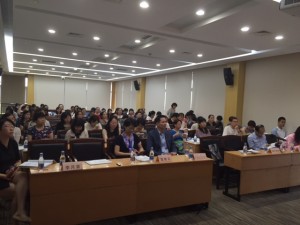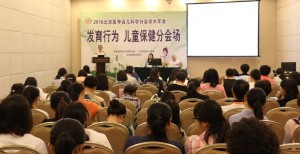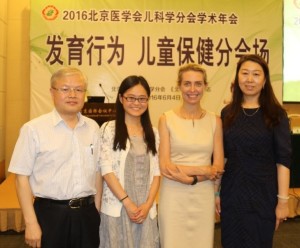The “Forum on Current Topics in Caring for Children -Nutrition, Development & Parenting” was held at Shenzhen Bao An Maternity and Children’s Hospital on 14 May. Many well-known professors and international and local supervising physicians were invited to this forum, the theme of children’s health care issues. Dr. Susan Cadzow, Director of Developmental-Behavioral Pediatrics for LIH Healthcare and Kristi Troutman, Occupational Therapist and Clinical Manager of LIH Olivia’s Place Shenzhen, both presented at the event.
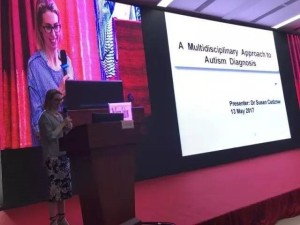 Dr.Susan Cadzow is an Australian-registered pediatrician and also a Fellow of the Royal Australasian College of Physicians. She has previously worked at Shanghai United Family Hospital and Royal Children’s Hospital, Brisbane. She is now the Director of Developmental Behavioral Pediatrics at LIH Healthcare.
Dr.Susan Cadzow is an Australian-registered pediatrician and also a Fellow of the Royal Australasian College of Physicians. She has previously worked at Shanghai United Family Hospital and Royal Children’s Hospital, Brisbane. She is now the Director of Developmental Behavioral Pediatrics at LIH Healthcare.
First, Dr. Cadzow explained what a multi-disciplinary team model is and why it is necessary in the diagnosis of autism. Due to complexity in diagnosis of autism and the similarity of symptoms to many other conditions, precise diagnosis requires the engagement of a team which may include a child’s doctor andoccupational therapy, physical therapy, psychological consultation, speech-language therapy, Learning support, and behavioral therapy.
Next, Dr. Cadzow explained in detail the goal of diagnostic assessment. At the end of the presentation, she expressed that she is looking forward to the further development in specialized services for treatment of autism for children and multi-disciplinary assessment team to enable early diagnosis and early intervention in China, as well as further understanding of practitioners on genetic conditions.
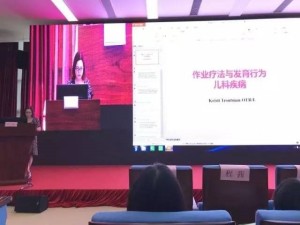
Kristi Troutman, LIH Olivia’s Place Clinical Manager, presenting on “Occupational Therapy and Developmental-Behavioral Disorders”
Kristi Troutman, OTR/L, Clinical Manager at LIH Olivia’s Place Shenzhen, has more than 25 years of occupational therapy experience; she has worked with children with a variety of diagnoses, including autism, ADHD, cerebral palsy, visual impairment, Angleman Syndrome, Noonan Syndrome, selective mutism, and developmental delay.
In her speech, she explained the concept and types of pediatric occupational therapy, and advocated the idea that “Family engagement is Essential in OT”- children, peers, family members, and adults work together on occupational activities such as feeding and eating, caregiver-child interaction in play, dressing, grooming, and personal hygiene. This joint effort is very important to infants, toddlers, children, and their families.
She put emphasis on the significance of occupational therapy, exemplified by how occupational therapy activities are designed to fit for the needs of every single child’s development. Her speech won applause from the audience from time to time, and was received very warmly. In the end, Ms. Troutman explained that the goal of treatment should be varied in terms of each individual, taking consideration of education at home and school, and also highlighted that treatment should be home-centered as appropriate.





